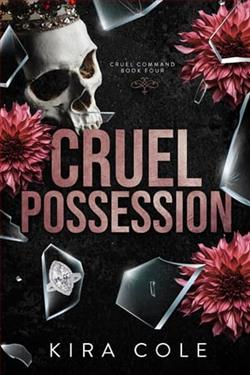Page 77 of Forced to Marry the Russian Pakhan
The doctor asks rapid-fire questions—date of my last period, any other symptoms, sexual activity. I answer mechanically, doctor-to-doctor, until he asks, “Is there any chance you could be pregnant?”
I blink, the question hitting me sideways. “No,” I say automatically. Then, “I mean—we only... once.”
Trifon goes very still beside me.
“Once is enough,” the doctor says, not unkindly. “We’ll check with the ultrasound.”
A nurse helps remove my dress, replacing it with a thin gown. The blood has soaked through to my thighs, bright red against pale skin.
Too much blood.
I’m a doctor.
I know what too much blood looks like.
The ultrasound machine appears. Cold gel on my abdomen. The wand pressing, searching. The room holds its breath.
And then—the sound. Fast, like galloping horses. A heartbeat.
Not mine.
“There,” the doctor says, pointing to the screen. “About six weeks, I’d say. Strong heartbeat.”
I stare at the tiny flicker on the screen. A baby. My baby. Our baby.
“I don’t understand,” I whisper. “I thought I had my period. There was spotting.”
“Implantation bleeding, perhaps,” the doctor says. “Or breakthrough bleeding. It happens to more women than you’d think, especially under stress.”
The irony doesn’t escape me. How many times have I said those exact words to worried patients? How many times have I missed my own symptoms?
“The baby is okay?” Trifon asks, his voice rough.
“For now,” the doctor nods. “But this is a threatened miscarriage. The bleeding is significant. She needs rest. No stress. No... marital activities. At least for the next few weeks.”
Trifon’s hand finds mine, squeezing hard. “What do we need to do?”
“We’ll monitor her overnight. If the bleeding stops, she can go home tomorrow, but she’ll need to take it very easy.”
The next hour passes in a blur of medications, monitors, and quiet medical discussions. I drift, the painkillers taking effect, aware of Trifon’s constant presence. He doesn’t leave, noteven when the nurses suggest he go get coffee or make calls. He sits beside the bed, my hand in his, watching me with an intensity that would be unnerving if I had the energy to care.
When we’re finally alone, the room dimmed and quiet, save for the steady beep of monitors, I find my voice.
“I didn’t know,” I say, the words thick in my throat. “I should have known. I’m a doctor, for God’s sake.”
Trifon leans forward, elbows on his knees. “You’ve been stressed. Working too hard.”
“That doesn’t excuse missing something this big.” I stare at the ceiling, tears pricking my eyes. “We only did it once.”
“Once is all it takes,” he echoes the doctor’s words.
“I know that.” I close my eyes, exhausted. “I just never thought...”
He’s quiet for a moment, then says softly, “Neither did I.”
I turn my head to look at him. In the half-light, his face seems younger, the hard edges softened by shadows and what might be fear.
“Are you angry?” I ask.















